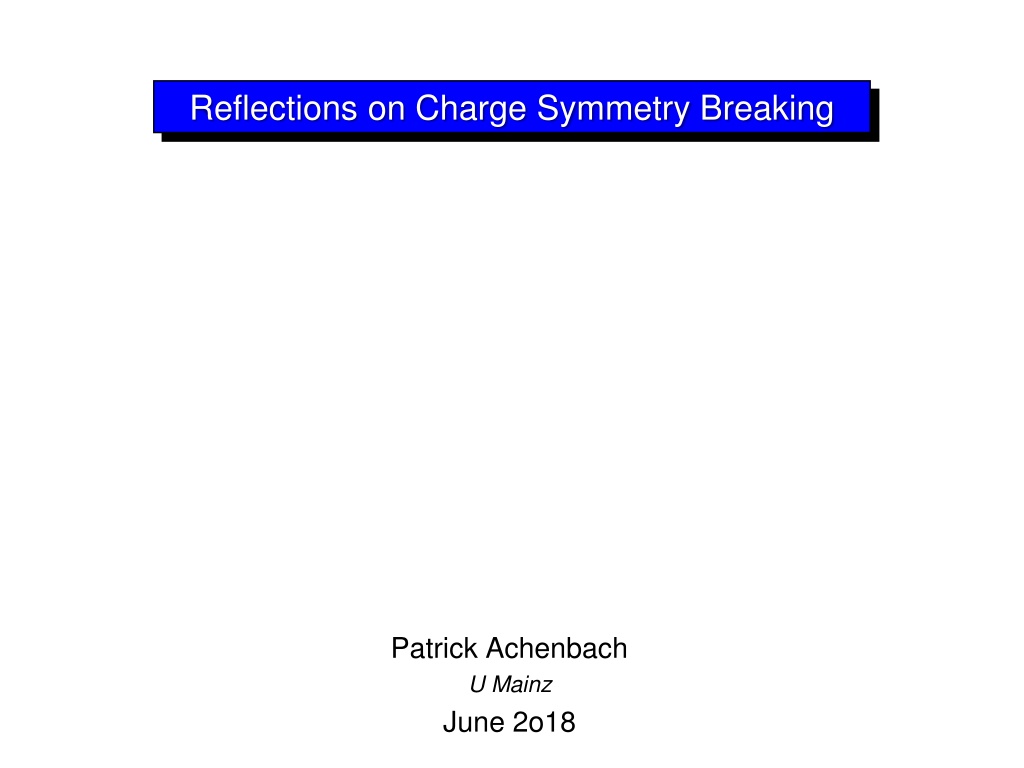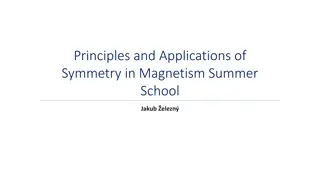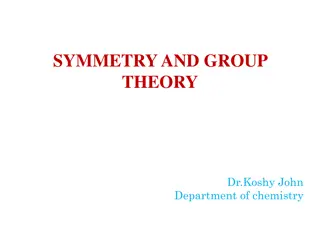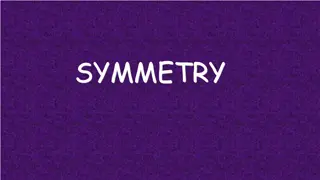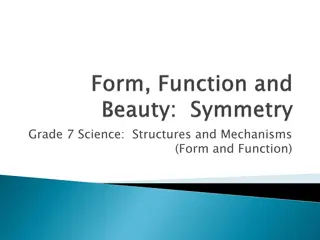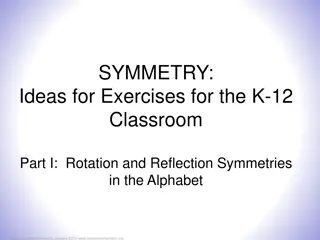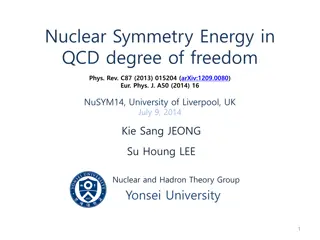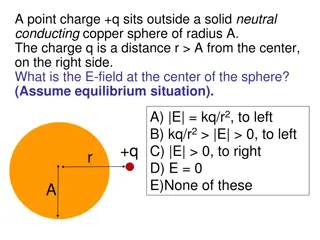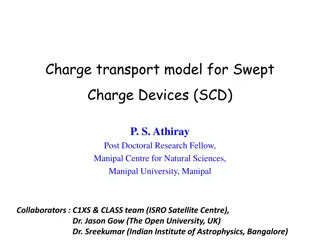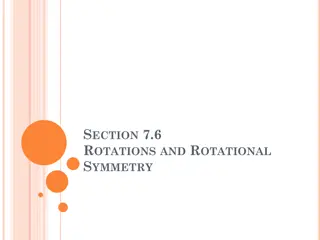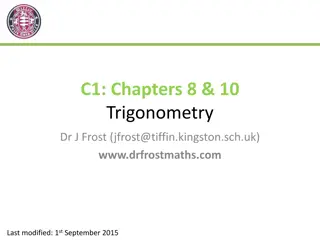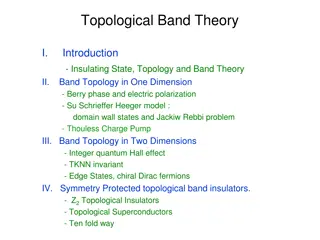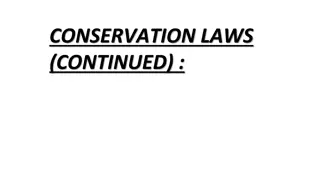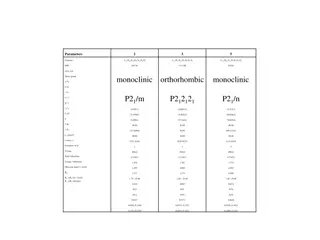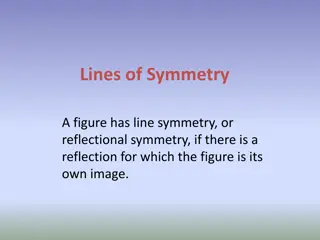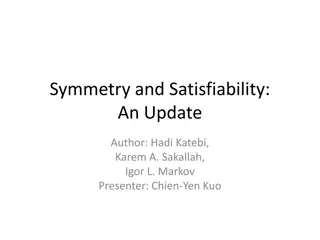Reflections on Charge Symmetry Breaking
The limitations of data in charge symmetry breaking studies, database issues, and the use of point estimators from different experiments. Explore the CSB databases and their implications for nuclear physics research.
Download Presentation

Please find below an Image/Link to download the presentation.
The content on the website is provided AS IS for your information and personal use only. It may not be sold, licensed, or shared on other websites without obtaining consent from the author.If you encounter any issues during the download, it is possible that the publisher has removed the file from their server.
You are allowed to download the files provided on this website for personal or commercial use, subject to the condition that they are used lawfully. All files are the property of their respective owners.
The content on the website is provided AS IS for your information and personal use only. It may not be sold, licensed, or shared on other websites without obtaining consent from the author.
E N D
Presentation Transcript
Reflections on Charge Symmetry Breaking Patrick Achenbach U Mainz June 2o18
Reflections on Charge Symmetry Breaking sizeable effect in A = 4 isospin mirror pair large experimental uncertainties in A = 7, 8, 9, and 10 isomultiplets what are the (quantitative and qualitative) limitations of the data? B = 0.35 0.06 Reflections on Charge Symmetry Breaking June 2o18 P Achenbach, U Mainz
Use of Point Estimators [M. Juri et al., Nucl. Phys. B 52 (1973) 1] Reflections on Charge Symmetry Breaking June 2o18 P Achenbach, U Mainz
CSB Database Issues (Personal Perspective) No do we have a complete set of statistical and systematic errors? are all of the errors symmetric? is the data normal distributed? No No are outliers of values treated consistently? (outliers can indicate a heavy-tailed distribution) do we know all the cross-correlated errors when combining binding energies from different measurements? No No are likelihood functions used to combine different experiments? do we have a coherent and fully accepted database? (analogous to the PDG compilation) No Reflections on Charge Symmetry Breaking June 2o18 P Achenbach, U Mainz
The CSB Database I [M. Juri et al., Nucl. Phys. B 52 (1973) 1] Reflections on Charge Symmetry Breaking June 2o18 P Achenbach, U Mainz
The CSB Database II [D.H. Davis, Nucl. Phys. A 754 (2005) 3c] Reflections on Charge Symmetry Breaking June 2o18 P Achenbach, U Mainz
The CSB Database II [D.H. Davis, Nucl. Phys. A 754 (2005) 3c] Reflections on Charge Symmetry Breaking June 2o18 P Achenbach, U Mainz
The CSB Database III [A. Gal, E. V. Hungerford, D. J. Millener, Rev. Mod. Phys. 88 (2016) 035004] Reflections on Charge Symmetry Breaking June 2o18 P Achenbach, U Mainz
The CSB Database III [A. Gal, E. V. Hungerford, D. J. Millener, Rev. Mod. Phys. 88 (2016) 035004] Reflections on Charge Symmetry Breaking June 2o18 P Achenbach, U Mainz
The CSB Database IV [E. Botta, T. Bressani, A. Feliciello, Nucl. Phys. A 960 (2017) 165] Reflections on Charge Symmetry Breaking June 2o18 P Achenbach, U Mainz
The CSB Database IV [E. Botta, T. Bressani, A. Feliciello, Nucl. Phys. A 960 (2017) 165] Reflections on Charge Symmetry Breaking June 2o18 P Achenbach, U Mainz
World data on A 10 systems B 4 clearest signature of charge symmetry breaking in A = 4 system weak indications of charge symmetry breaking in A 4 systems Reflections on Charge Symmetry Breaking June 2o18 P Achenbach, U Mainz
World data on 4H mass outer error bars correlated from calibration B (4 H) (stat.) 2.04 0.04 0.05 MeV 2.12 0.01 0.08 0.03 MeV [A. Esser et al., PRL 114 (2015)] 2.16 0.01 0.08 MeV (syst.) emulsion: MAMI 2012: MAMI 2014: [M. Juric et al. NP B52 (1973)] [F. Schulz et al., NPA (2016)] Reflections on Charge Symmetry Breaking June 2o18 P Achenbach, U Mainz
